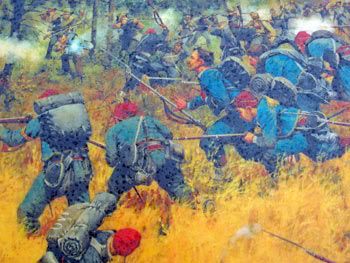The Wilderness
In 1864 the war was taking on a desperate character for both sides. Despite the success at Gettysburg in 1863, the pursuit had been ineffective and the North had, once again, been unable to make significant progress against Virginia, the heart of the Confederacy.
The problem was simple - every time the Union took an army to Virginia, the Confederates would, with inferior numbers but superior officers and strategic capability, outmaneuver the invaders and force their retreat. It happened every year:
- 1861:
- First Bull Run - "On to Richmond!" did not work out well
- 1862:
- The Seven Days Battles (June) - McClellan threatened Richmond, but was outgeneralled by Robert E. Lee and ultimately withdrew.
- Fredericksburg (December) - The most one-sided battle of the Civil War, with Burnside's ill-advised aggression arguably overcompensation for McClellan's overcautiousness.
- 1863
- Chancellorsville - Lee's "Perfect Battle"
It was a hard place to walk, let alone fight. Lee was badly outnumbered (60,000 against 100,000) so tried to force action in the difficult terrain. Grant hoped to avoid it. As usual, Lee got the battle he wanted: the two armies met a few miles west of the Chancellorsville battleground.
It was one of the largest battles of the war (30,000 more men were involved than at Gettysburg), and it was horrific. At one point a brushfire broke out, burning to death hundreds of wounded men between the lines. Top-level command and control was impossible. As usual, the veteran Confederate units fought effectively, and after two days had once again bloodied the Army of the Potomac. The South had 11,000 dead, wounded or captured, while the Union had lost 17,000. The 140th New York Zoaves, heroes at Gettysburg, lost half their men and virtually all their officers in just a few minutes of combat.

Even Grant was shaken. "More desperate fighting," he would later write, "has not been witnessed upon this continent." Historian Shelby Foote said:
Grant in the Wilderness, after that first night in the Wilderness, went to his tent, broke down, and cried very hard. Some of the staff members said they'd never seen a man so unstrung.But, Foote continues, he wasn't crying the next morning. He got up and they fought again the next day. And then, as usual, the Union forces began to pack up and move out. In his fine Battle Cry of Freedom, James McPherson writes:
But instead of heading north, they turned south. A mental sunburst brightened their minds. It was not another "Chancellorsville ... another skedaddle" after all. "Our spirits rose," recalled one veteran who remembered this moment as a turning point in the war. Despite the terrors of the past three days and those to come, "we marched free. The men began to sing." For the first time in a Virginia campaign the Army of the Potomac stayed on the offensive after its initial battle.It was the beginning of the end for the Confederacy. Lee would have to face Grant again in two weeks at Spotsylvania, and in a month's time at Cold Harbor. In each of those battles, the Confederates inflicted more casualties than they suffered. But in percentage terms Lee's losses were greater, and Grant could make good his losses while Lee could not.
Historians treat Grant's long march to Appomattox as three separate campaigns - the Overland Campaign, the Siege of St. Petersburg, and the Appomattox Campaign. But in reality it was one extended death embrace, and it began at the Wilderness, at about the corner of the Orange Turnpike and the Germanna Highway.
Today, Wal-Mart is planning to build a store there (photos here), and threatening to bring significant additional traffic and further development pressure to this historic area. The only reason they haven't done so already is the determined opposition of patriotic organizations seeking to preserve this and other Civil War battlefields. We urge readers of this blog to support these organizations.
We don't hear it said much anymore, but it's still true: American is a free country. That freedom was hard-won. We should show a little respect to the memory of those who won it, even when it is not profitable, even when it is not politically advantageous. Surely we owe them that much.


1 Comments:
Nice article. Maybe when we're retired we can play this.
Post a Comment
<< Home